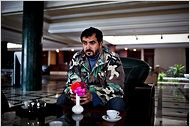Top Libyan Rebel Was Gitmo Detainee
For more than five years, Abu Sufian Ibrahim Ahmed Hamuda bin Qumu was a prisoner at the Guantánamo Bay prison, judged “a probable member of Al Qaeda” by the analysts there. They concluded in a newly disclosed 2005 assessment that his release would represent a “medium to high risk, as he is likely to pose a threat to the U.S., its interests and allies.”
Today, Mr. Qumu, 51, is a notable figure in the Libyan rebels’ fight to oust Col. Muammar el-Qaddafi, reportedly a leader of a ragtag band of fighters known as the Darnah Brigade for his birthplace, this shabby port town of 100,000 people in northeast Libya. The former enemy and prisoner of the United States is now an ally of sorts, a remarkable turnabout resulting from shifting American policies rather than any obvious change in Mr. Qumu.
He was a tank driver in the Libyan Army in the 1980s, when the Central Intelligence Agency was spending billions to support religious militants trying to drive Soviet troops out of Afghanistan. Mr. Qumu moved to Afghanistan in the early 1990s, just as Osama bin Laden and other former mujahedeen were violently turning against their former benefactor, the United States.
He was captured in Pakistan after the Sept. 11, 2001, terrorist attacks, accused of being a member of the militant Libyan Islamic Fighting Group, and sent to Guantánamo — in part because of information provided by Colonel Qaddafi’s government.
“The Libyan Government considers detainee a ‘dangerous man with no qualms about committing terrorist acts,’ ” says the classified 2005 assessment, evidently quoting Libyan intelligence findings, which was obtained by The New York Times. “ ‘He was known as one of the extremist commanders of the Afghan Arabs,’ ” the Libyan information continues, referring to Arab fighters who remained in Afghanistan after the anti-Soviet jihad.
When that Guantánamo assessment was written, the United States was working closely with Colonel Qaddafi’s intelligence service against terrorism. Now, the United States is a leader of the international coalition trying to oust Colonel Qaddafi — and is backing with air power the rebels, including Mr. Qumu.
The classified Guantánamo assessment of Mr. Qumu claims that he suffered from “a non-specific personality disorder” and recounted — again citing the Libyan government as its source — a history of drug addiction and drug dealing and accusations of murder and armed assault.
In 1993, the document asserts, Mr. Qumu escaped from a Libyan prison, fled to Egypt and went on to Afghanistan, training at a camp run by Mr. bin Laden. At Guantánamo, Mr. Qumu denied knowledge of terrorist activities. He said he feared being returned to Libya, where he faced criminal charges, and asked to go to some other country where “You (the United States) can watch me,” according to a hearing summary.
Nonetheless, in 2007, he was sent from Guantánamo to Libya and released the next year in an amnesty for militants.
Colonel Qaddafi has cited claims about Mr. Qumu’s past in statements blaming Al Qaeda for the entire Libyan uprising. American officials have nervously noted the presence of at least a few former militants in the rebels’ ranks.


